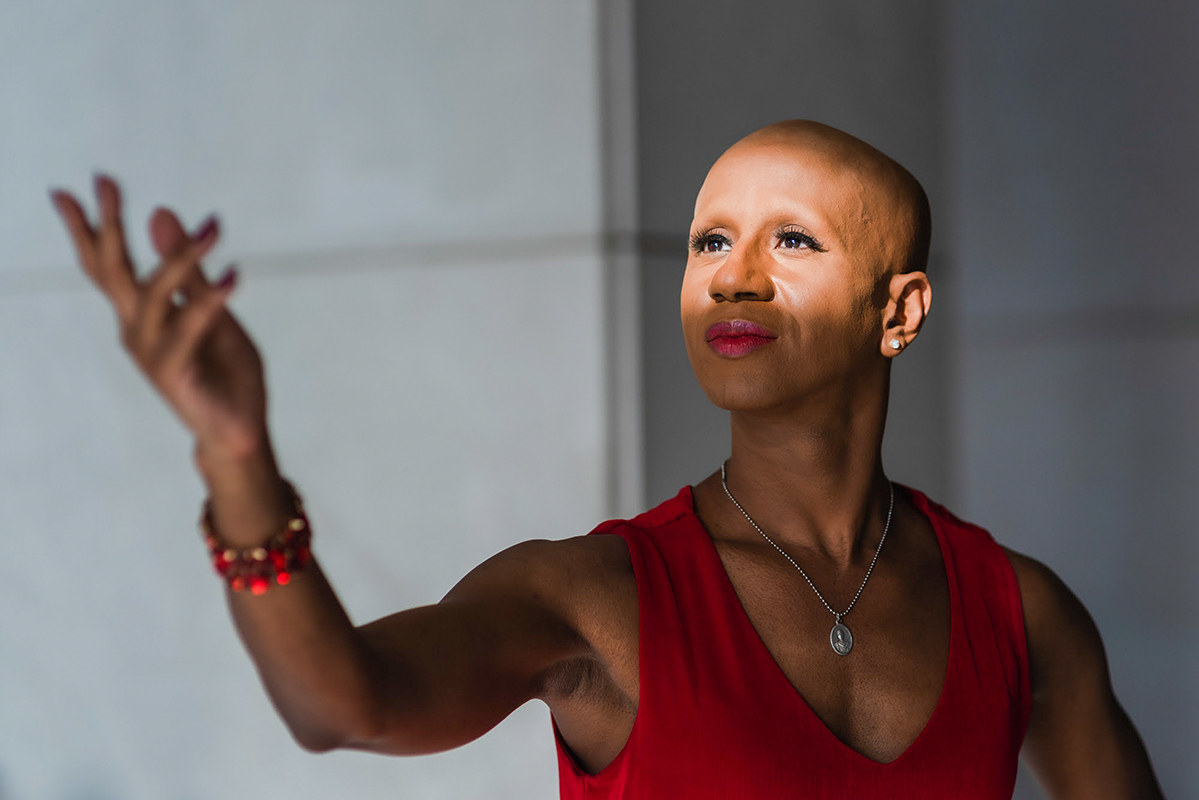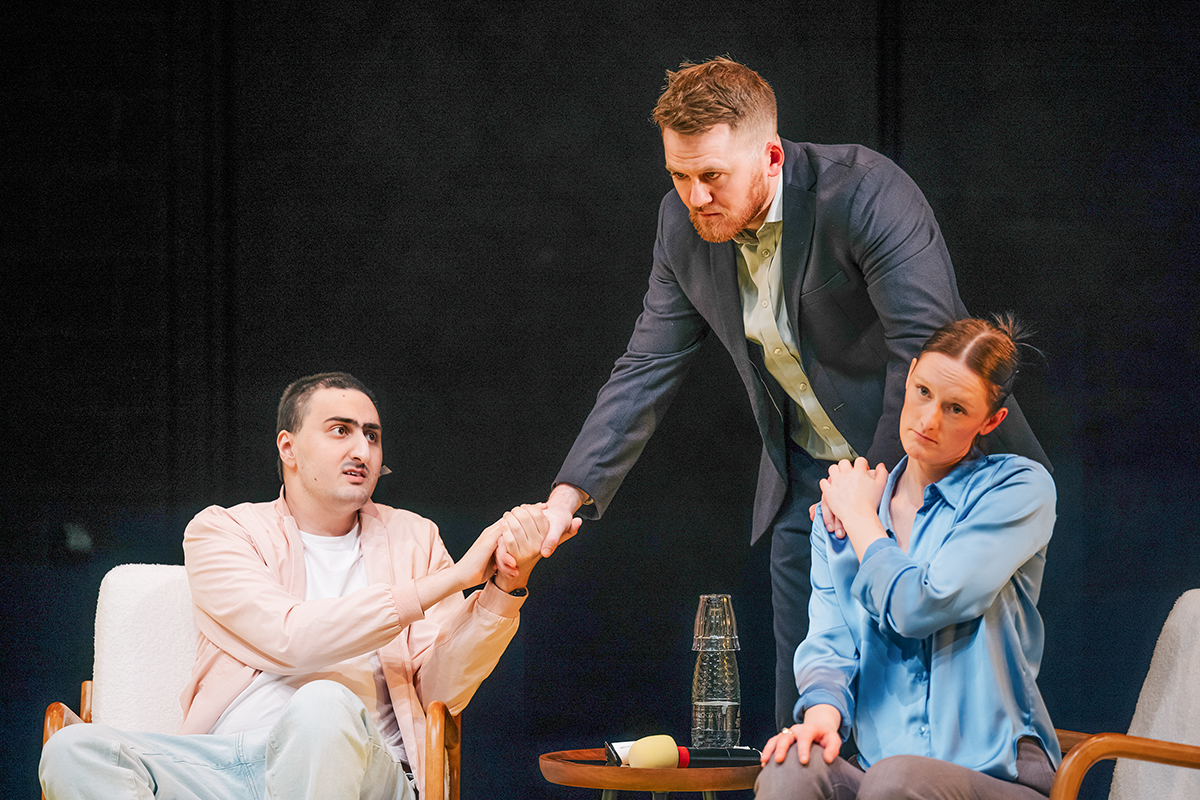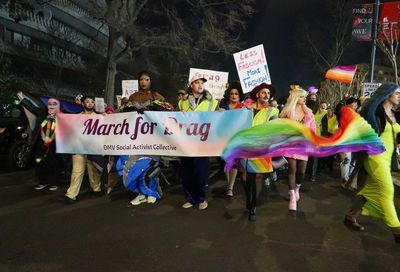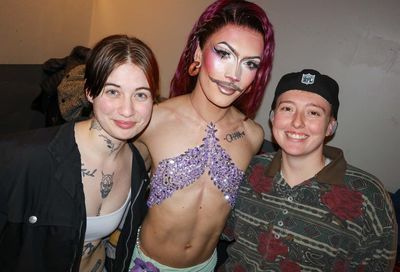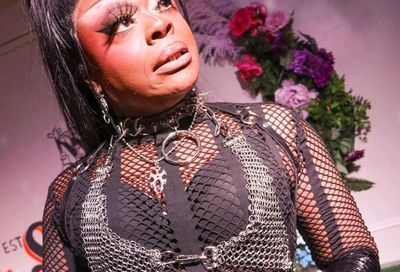Other Worlds
Playwright Roberto Aguirre-Sacasa's Fantastic Journeys
Photography by Todd Franson
Roberto Aguirre-Sacasa sometimes finds it hard to write by the rules other people make. During his recent studies at the Yale Drama School, one of his assignments was to write a one-hour play that used just one set and no more than four actors.
“The play I wrote was over two hours long, had seven actors — two of whom were kids — three sets, and a giant squid,” he laughs.
 |
That play, The Muckle Man, went on to gain him acclaim in his hometown of Washington with a production at the Source Theatre. He cemented his reputation as one of the theatre’s emerging young talents with the romantic comedy Say You Love Satan and the award-winning ghost story of The Mystery Plays. Now he’s back at the Source, fresh out of Yale, with another tale of a different world, Dark Matters. This time writing under a set of rules was a welcome challenge — because they were rules he set for himself.
“I wanted the challenge of telling a galactic, cosmic story, possibly about extraterrestrials, on a shoestring budget,” he says. “That was part of the fun — how to create an enormous other world on a living room set.”
At 30-years-old, Aguirre-Sacasa seems to be forging a career of enormous other worlds. At his new home in New York City, his work on plays is matched by the challenges of another enormous cosmic story: the Fantastic Four. His “darker, edgier” version of the iconic superhero quartet hits comic book stores next February.
METRO WEEKLY: When did you start writing plays?
AGUIRRE-SACASA: I always thought I would do some kind of writing before I was a playwright, and I actually did some journalism work here in D.C. But I think I started writing plays in high school. Really horrible plays. I used to type them up on construction paper because if you wrote a twelve page play on construction paper it looked really thick. [Laughs.]
MW: What was your progression in becoming a professional playwright, that ended up with you going to Yale Drama School?
AGUIRRE-SACASA: I was working as the publicist at the Shakespeare Theatre, when Arena Stage was doing a production of Paula Vogel’s play How I Learned to Drive. Paula [was having one] of her world-famous boot camps for playwrights there, because Paula’s a great playwright and a really extraordinary teacher. So Arena invited other D.C. theaters to send their resident playwright to the boot camp. Of course, the resident playwright at the Shakespeare Theatre is Shakespeare. But Michael Kahn, the Shakespeare’s artistic director, had seen a couple of my really barebones productions that me and friends had thrown together here in D.C., and he asked me if I wanted to go. So I did this boot camp with Paula. At the end of it, Paula asked me, “Are you going to get serious about this?” I said I would like to, and she said, “I would get serious about it, right now.”
While I was working at the Shakespeare I had been writing plays like everyone else — in the morning, after work, on weekends, but I really wasn’t focusing on it. I had taken a playwriting class at Georgetown, but there was no theater major at Georgetown. So I started applying to graduate programs in playwriting and I got into was Yale. I went to visit it and I felt like it was the right place to go. I just graduated in May 2003.
MW: It seems like so many writers want to focus on screenplays or novels? Why were you attracted to plays?
AGUIRRE-SACASA: I tried to write a couple of novels. I got to like page thirty, and I was thinking, “This is so boring.” I just love theater. I love going to theater. I love the collaborative aspect of putting on a play and working with actors and a director. Because writing, as you know, is fairly solitary. And that can get kind of lonely, so I really embrace [the collaboration].
When I started writing it made sense to start writing for theater because I loved it so much. But at the time I had no idea that you could be a professional playwright — I really didn’t know anything about the business side of it.
MW: You said you had staged some “barebones” productions before you seriously began study as a playwright. What do you consider to be your first production?
AGUIRRE-SACASA: The summer after my first year at Yale, Source put on a production of my play The Muckle Man. At the same time, a theater in Atlanta was doing a production of my play Say You Love Satan. They both received nice reviews and got some attention, so it helped me get an agent and do all that stuff. They were both very different plays — The Muckle Man is kind of a serious family drama with supernatural overtones, and Say You Love Satan is more of a romantic comedy spoof of the Omen movies.
MW: A lot of novelists and other writers are identified by genre labels. Is there a similar way that you would identify yourself as a playwright?
AGUIRRE-SACASA: “Emerging playwright” is the label that’s slapped on me a lot. I don’t know — certainly a lot of my plays have fantastical themes, but not all of them do. It’s hard to say.
MW: Did you read a lot of fantastic and supernatural stuff when you were growing up?
AGUIRRE-SACASA: Definitely. I read a lot of Stephen King, Clive Barker, H.P. Lovecraft — not so much science fiction, but more fantasy and horror and supernatural stuff, along with other things. I guess a lot of pop cultural elements are in my plays because my plays have young people — young meaning our age — and a lot of what we do is talk about movies and books. That’s our vocabulary; there’s a lot of common ground. I also grew up seeing old black and white movies and reading comic books, so it seems totally natural to absorb all that stuff and then translate it and refigure it in a different kind of way.
 Dark Matters |
MW: How did Dark Matters come about?
AGUIRRE-SACASA: A couple of years ago two books came out about a famous murder case in rural Ireland in the late 1800s. A woman who had vanished for a couple of weeks was discovered buried in a shallow grave, burnt to death. When the authorities arrested her husband, he said, “Oh, no, that wasn’t my wife. The fairies took away my wife. That was a changeling that the fairies left that looked like my wife. I was trying to get the changeling to tell me where my wife was and the changeling died.” It turned out that for those two weeks that she’d been missing the husband had been torturing her to try to get the truth about his wife. And the woman’s father and brothers were helping him because they were all convinced that she was a changeling.
I read these books and thought this is a really great play. I started writing this play set in rural Ireland in the late 1800s, and ten pages into it I was like, I don’t know anything about rural Ireland in the 1800s. I thought it was such a gripping story, so I put it aside but kept it kicking around in my head. It reminded me a lot of Othello, and what happens when Othello becomes convinced that Desdemona is not what she says she is and she’s completely helpless to convince him otherwise.
Then a friend of mine asked me if I had ever thought of writing about aliens. I said, “That’s too tabloidy for me, I don’t write that kind of stuff.” He gave me a book of these first-person accounts of alien abductions. They were terrifying, because whether or not you believe in aliens these people believed they had been abducted. Then I thought I could take the very basic idea of that murder case in rural Ireland, set it in the United States, essentially replace the fairies with aliens, and tell a similar story. It just became a different story, still from this kernel.
MW: Now that you’ve graduated and are living in New York, are you working full-time as a writer?
AGUIRRE-SACASA: I’ve got a couple of big productions coming up in the spring. I’m working on a screenplay for The Muckle Man. And I’m writing the Fantastic Four for Marvel. I kept thinking I would have to get a job to supplement my income, but between the Fantastic Four, which is like the greatest day job in the world, and my playwriting and the screenplay option, I’m doing pretty well. I can more or less support myself writing.
MW: With writing comic books it seems like you have two parallel careers going on. What made you want to pursue that?
AGUIRRE-SACASA: Like I said, I grew up reading comic books. My mom would take us out to the 7-Eleven on River Road during the summer, and we would get Slurpees and buy comics off the spinning rack. I would read them all over and over again, and draw my own pictures and stuff.
What happened was I wanted to get into it, and I thought that if I was successful as a playwright I could then maybe write letters to Marvel and D.C. and say “Hey, I’m a playwright, I really like comic books.” What actually happened was that Marvel hired an editor to find new writers, and they hired her from a theatrical agency. So she started calling theaters and asking if they knew any playwrights who might be good for comic books. A couple of different theaters said she should look at me. So she called me, I sent her a couple of my plays and she said “Great, would you like to pitch on a couple of comic books in the works?”
When she called I thought this is exactly the kind of thing I’d love to do. But I also knew that I’d never done it before, and if I got a job it would be like on a second string superhero. In fact, when she first called me she said they were starting a new book for Hawkeye — he’s an Avenger, and I didn’t know anything about him [other than] that he was an archer. [I was in France at the time] and I spent a lot of that vacation going to French comic book stores and trying to translate old Avengers comic books into English to figure out who Hawkeye was. I wrote this insanely long, convoluted pitch for a character I really didn’t know. I think Marvel was like, this is good writing, but it’s not what we’re interested in for the character.
So they asked me about the Incredible Hulk, and I wrote another pitch. It was a lot shorter and I think closer to what they were looking for, but it wasn’t a hundred percent right. Then they said they were thinking about doing a Fantastic Four comic book that focuses mostly on the family — because the thing about the Fantastic Four is that they’re not like a super hero team like the X-Men or the Justice League, they’re a family that happens to be a super hero team.
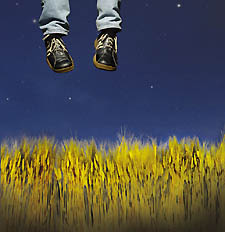 |
MW: Because they happened to go into space together and get exposed to gamma rays.
AGUIRRE-SACASA: Exactly. And the idea was that they were going to have real life crises — they were going to lose their huge fortune at the start of the series, and how would they deal with that? At the time I was feeling a lot of anxiety about graduating and finding a place to live and how was I going to make ends meet, so that really tapped into something. I wrote a proposal and they were like, “This is it, this is exactly right.” So I started working on the comic book. There was going to be the regular Fantastic Four and then [this book] was going to be another title. Then Marvel said, “Actually you’re going to be writing the regular Fantastic Four.” I’m not entirely sure what happened behind the scenes, but Mark Waid, who was writing the [regular book] Fantastic Four, has a huge supportive fan base. All the fans were in an uproar that he was not going to be writing it, and this total unknown was going to be writing the Fantastic Four.
So Marvel went back to the original idea, which was to give us our own title, because our stories were kind of a little more offbeat than the traditional Fantastic Four. And that suits me fine, because the Fantastic Four that we’re writing is less about Dr. Doom and Galactus and more about what really happens between these four strange people.
MW: It seems like we all know about the Fantastic Four because they are iconic on one level, but when you think comics nowadays, you don’t necessarily think of them — you think of Spider-man and Batman.
AGUIRRE-SACASA: Actually, the Fantastic Four came before Spider-man. Stan Lee was about to quit comics when he created the first issue of Fantastic Four with Jack Kirby. And it ushered in the Marvel Age of comics. The Fantastic Four has kind of gone through hard times, although they always have a very passionate fan base. They’ve never been kind of Marvel’s crown jewel. Now with a Fantastic Four movie in the works, they’re really trying to ramp up its prominence in the company. It came at a lucky time for me — they were characters that I could write at a time when Marvel was interested in putting them at the forefront of their comics publishing.
And the Fantastic Four is so different now, and it also isn’t that different. That first run [by Stan Lee and Jack Kirby] is legendary, because everything in there was so new — the way they relate to each other, they way the Thing is unlikable, the way the Human Torch is so immature, that there was no sexual tension between Reed and Susan because they were married. There’s nothing that’s really broken with the Fantastic Four, because they were such great creations.
In fact, it’s funny, when I was writing the first story line about them losing their fortune and their home in New York, I was reading the original issues. And in issue number nine, the Fantastic Four loses their fortune and they have to go to Hollywood to be in a movie of their own adventures to get their fortune back, which is kind of really meta and was kind of trailblazing.
MW: Which is more pressure for you as a writer, doing plays that you know are going to be discussed and reviewed by critics and your peers, or writing a comic book that you know is going to be discussed and reviewed by this gigantic fan base?
AGUIRRE-SACASA: Well, they’re different. Probably because plays are so much more personal for me, there’s probably more of me in my plays than there is in my comic book writing, I feel that kind of pressure. I mean, with a fan base like the Fantastic Four’s, you know that you will never please everyone. And ultimately they are other people’s characters and creations — I just happen to be the guy who’s keeping watch over them while I write their adventures.
It’s not that I don’t have a personal stake in them — I really think about these characters a lot. I’ll come across something that makes me think, “That would be really great if the Invisible Woman did…” I’m thinking in those terms all the time because I really love the characters. I appreciate the fact that there is a really passionate fan base, which I don’t want to alienate. I want to do justice to these legends.
Dark Matters runs through January 3, 2004, at Source Theatre, 1835 14th Street NW. General admission tickets $20. Call 202-462-1073 ext. 17 or visit www.sourcetheatre.com.
Support Metro Weekly’s Journalism
These are challenging times for news organizations. And yet it’s crucial we stay active and provide vital resources and information to both our local readers and the world. So won’t you please take a moment and consider supporting Metro Weekly with a membership? For as little as $5 a month, you can help ensure Metro Weekly magazine and MetroWeekly.com remain free, viable resources as we provide the best, most diverse, culturally-resonant LGBTQ coverage in both the D.C. region and around the world. Memberships come with exclusive perks and discounts, your own personal digital delivery of each week’s magazine (and an archive), access to our Member's Lounge when it launches this fall, and exclusive members-only items like Metro Weekly Membership Mugs and Tote Bags! Check out all our membership levels here and please join us today!




